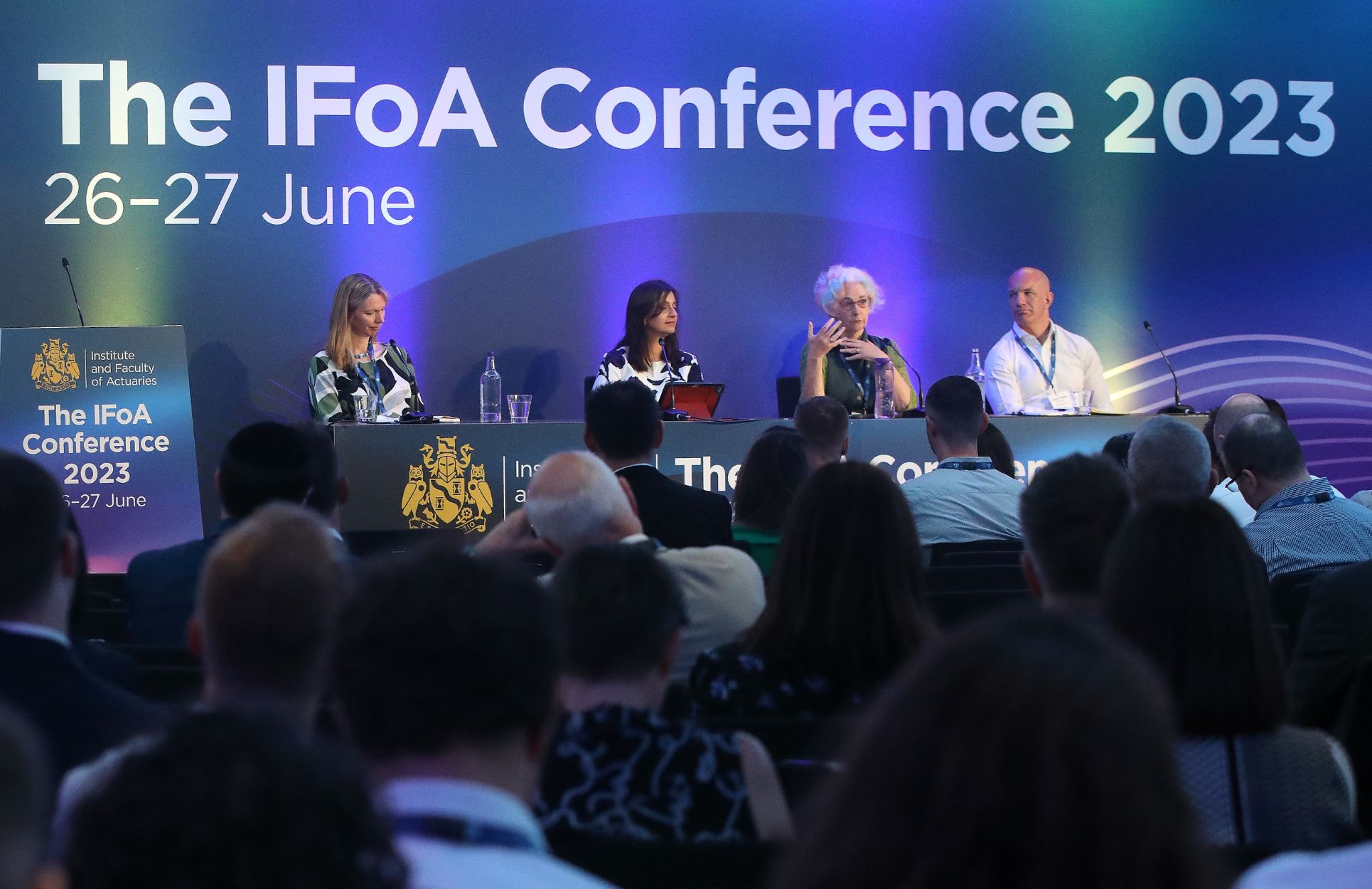 A summary of plenary 1 at the IFoA Conference (26 to 27 June 2023) on ‘navigating the permacrisis – the actuarial profession’s role in weathering the storm’
A summary of plenary 1 at the IFoA Conference (26 to 27 June 2023) on ‘navigating the permacrisis – the actuarial profession’s role in weathering the storm’
The Chair Kalpana Shah began by noting that ‘permacrisis’ was the Collins Dictionary’s Word of the Year for 2022. It is defined as ‘an extended period of instability and insecurity, especially one resulting from a series of catastrophic events’.
There is a sense that the world is lurching from one unprecedented crisis to the next. While this is daunting, Shah said she believed IFoA members have the skillsets, international reach, and range of specialist knowledge to contribute to solving these problems.
Greg Thwaites focused his opening comments on inequality. The cost of living crisis has highlighted this in the short term. Referring to the UK, he mentioned huge increases in the cost of energy, then food, which have both hit poorer people hardest.
More recently mortgages have also increased sharply. People are spending an increasing proportion of their income on essentials. Thwaites also gave disturbing evidence of the growing incidence of low-income families where people are skipping meals on a regular basis. Inequality is also a longer-term problem. The Gini coefficient of inequality increased significantly in the 1980s and has remained high, partly because of sluggish economic growth in the 2010s.
Camilla Cavendish said the financial crisis of 2008 was devastating and the economy has not fully recovered. There has also been a large increase in geopolitical uncertainty. Although CEOs need to think much more about geopolitics than they used to, the reality is that it’s impossible to predict what politicians will do.
Turning to health and demographics, Cavendish noted that health inequality is stark. Healthy life expectancy is 8 years higher for wealthier groups living in the South than poorer groups in the North. Preventative health should be a priority, including social care insurance. She also said she believes the UK government should have given more attention to mental health during the pandemic. At a global level, she said policymakers need to think about the implications that most countries now have fertility rates below the replacement level.
Louise Pryor mentioned some of the sustainability elements in the permacrisis. She said investment by pension funds and insurers will need to change. That’s not only because of more volatile interest rates but also to take account of the impacts of climate change and biodiversity loss. The IFoA Sustainability Board is producing a range of practical guides on both these issues.
Pryor added that actuaries operate in the ‘engine room’ of financial services. They have the risk-management skills to consider what could happen (even if it would be unprecedented) and to review others’ policies. This is valuable in a more uncertain world with finite resources.
She also mentioned specific actuarial contributions, such as the high-quality information provided by the Actuarial Response Group during Covid and the CMI’s valued outputs. The IFoA’s Policy Team has addressed key areas of the permacrisis. These include the Great Risk Transfer from institutions to individuals, the ageing population, and intergenerational fairness.
Greg Thwaites supported higher investment from both the public and private sectors, and a focus on reducing regional inequalities. Regulation is needed not just on minimum wages but also to require minimum levels of working conditions. That’s especially the case in sectors such as retail, care, and hospitality.
Camilla Cavendish welcomed signals that the UK government is moving towards an industrial strategy. She said she supports its aim to remain involved in the Horizon Europe Scheme for research and development.
One questioner thought the focus on permacrisis was too negative. They said the belief that the quality of life was better a few decades ago is not robust. Panellists agreed there were positive and not just negative aspects in recent events. Those include the unity, volunteering spirit, and willingness to make sacrifices that were shown during the pandemic and in the Homes for Ukraine scheme.
Another questioner noted the accelerating pace of recent crises, which is making it difficult for our systems to cope. The panel acknowledged the challenge of regulating industries that are developing fast. It said there was a case for a ‘big state’ approach to regulating areas like AI and genetics. But the panel also noted that in the UK few politicians have a scientific or technical background. This prompted a general concern about the negative image of politics discouraging talented people from entering the profession.
Demographic issues were raised, such as fertility rates and migration. The panel agreed that actuaries could provide insights here. They mentioned some unexpected angles. For example, new migrants no longer have significantly larger families than the average for their host nations. And international aid can actually increase migration in the short term, as more people can afford to leave.
On climate change, there was a challenge in the session for wealthier nations to have a more altruistic worldview and greater willingness to be uncomfortable.
There was a question about how to change the mindset that economic growth can continue indefinitely. One panellist responded that this would require a profound rethinking given that we currently worry more about too little growth than too much. Any change would need wide public support.
You can purchase and watch all the conference plenaries on our Virtual Learning Environment.